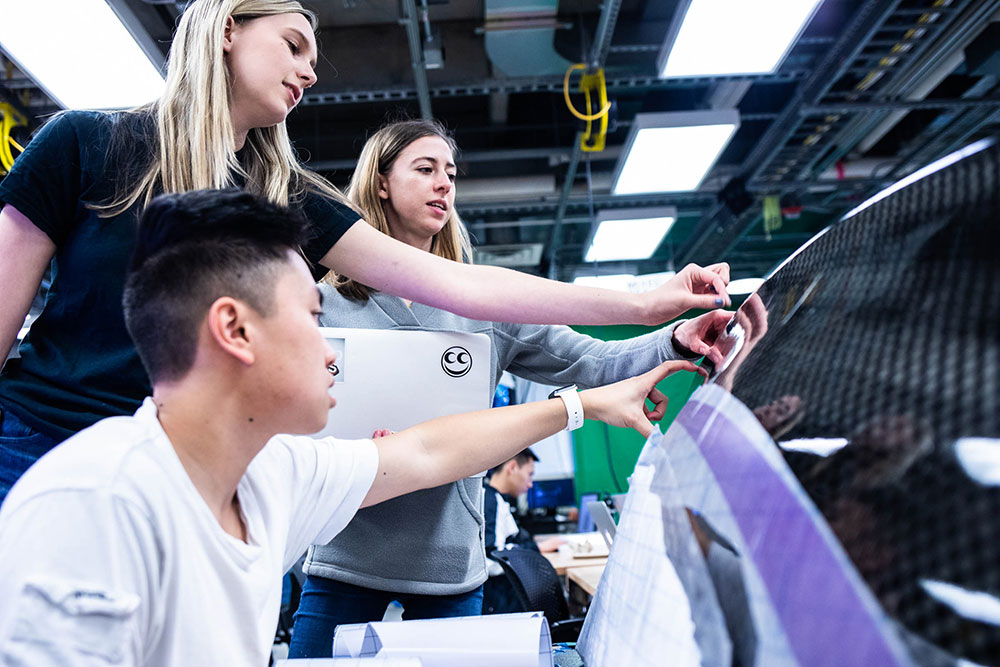Overview Outcomes Courses Admission Instructors

Composite Structures: Materials and Manufacturing
NEXT START DATE: September 24, 2025
DEADLINE: August 1, 2025
LOCATION
In-person or Online
DURATION
9-24 months
TOTAL COST
$15,000 (estimated)
Program overview
Advanced composite materials such as carbon fiber reinforced plastics (CFRP) are being increasingly used on many aircraft structures globally to improve performance and reduce weight. This program, offered jointly between Materials Science & Engineering and Mechanical Engineering, aims to improve core competencies to aid in producing reliable and cost-effective aircraft structural components. Students will acquire an in-depth knowledge of materials and state-of-the-art composite manufacturing processes, as well as key elements of quality control, specific tooling requirements and many faceted repair and maintenance approaches for composite structures.
This graduate certificate includes a comprehensive experiential learning component. This will involve analyzing real-world case studies, allowing students to apply the fundamental understanding covered in the class. The experience will also provide an opportunity to interact with subject matter experts, further deepening students' knowledge and understanding of the practical application of course material. This culmination of the course will ensure students are well equipped to face real-world challenges, effectively utilizing their learned knowledge of composite materials.

Designed for working professionals
The certificate courses are designed for working professionals or those planning to enter the workforce. It is anticipated that the typical student will complete the certificate over a year.

Earn graduate credit
By completing this certificate program, you can earn graduate credit. Learn more about credit options.

Learn in-person or online
You can choose to attend classes either online or in person each week. Classroom sessions are held at the UW Seattle campus. Online classes are streamed live via web conferencing, and all sessions are recorded for later review.
Learning outcomes
- Describe the differences between composite and metallic materials, the effects of environment, and the mechanical and physical properties of constituents (fibers and matrices).
- Summarize material selection approaches, methods and reasons for toughening polymers, and resin cure kinetics.
- Summarize micro-mechanics of composite materials and load transfer analysis.
- Describe manufacturing fundamentals, including design for manufacturing and maintenance the characterizing, dispositioning, and rework/repair of defects, closed and open mold composite manufacturing processes, and quality control.
- Characterize the application and importance of proper design and fabrication for various types of production tools, such as layup molds and secondary tooling.
- Explain the various issues associated with cost and producibility.
Courses
Complete the courses listed below to earn the certificate. You may be able to take individual courses without enrolling in the certificate program.
Certificate stackability
Students can choose to take the certificate independently or combine it with another eligible certificate to create a Master of Engineering in Multidisciplinary Engineering degree.
Application requirements
Your application must include a resume or curriculum vitae, your statement of purpose and an unofficial transcript.
Meet your instructors
In addition to regular course instructors, shown below, students will attend lectures and discussion forums with subject matter experts across industry.
Associate Professor, UW Materials Science & Engineering
Dwayne received his Ph.D. in Mechanical Engineering at the University of Washington in 1996. In addition to Materials Science & Engineering, he holds adjunct appointments in Mechanical Engineering, Oral Health Science and Restorative Dentistry. His research is broadly focused on the microstructure and mechanical behavior of engineering and natural materials.
Assistant Professor, UW Mechanical Engineering
Lucas received his Ph.D. in mechanical engineering from the California Institute of Technology in 2016. His research investigates the mechanics of architected materials at micro- and nanometer length scales. He is also affiliated with the Institute for Nano-Engineered Systems.

Charles Seaton
Lecturer, UW Materials Science & Engineering
Charles Seaton received an M.S. in Materials Science from the Massachusetts Institute of Technology, M.B.A. from Stanford University, and a B.S. degree from the University of Washington. In addition to his teaching responsibilities, he serves as advisor and facilitator of structural engineering education initiatives for the FAA.
Assistant Professor, UW Mechanical Engineering
Aniruddh received his Ph.D. in engineering sciences and mechanics engineering from Pennsylvania State University in 2018. His main areas of interest in Advanced Composite Materials are sustainable toughened composites, energy efficient manufacturing, and nano-structure-property relationship. He is affiliated with the Advanced Composites Center (ACC) and the Boeing Advanced Research Center (BARC).
Assistant Professor, UW Materials Science & Engineering
Navid received his Ph.D. in civil/structural engineering from the University of British Columbia in 2010. His research primarily explores the convergence of materials science, data science, and advanced manufacturing technologies. He is a member of the Scientific Advisory Committee at BARC, and is affiliated with the ACC.